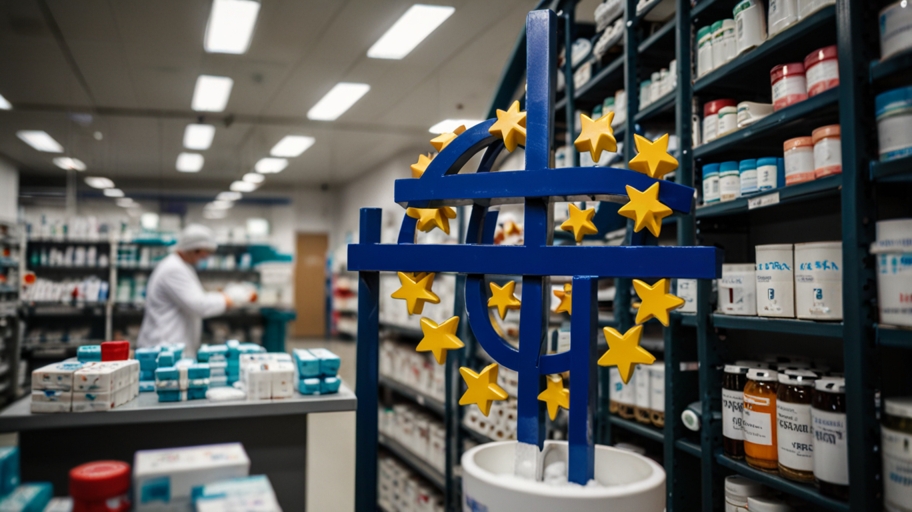The pharmaceutical companies headquartered in Europe are getting ready to face some very steep problems since the United States is going to announce the new tariffs today. The industry, which had been enjoying the ban of trade duties so far, now‘fares infinite as the hope for the continuation of the protection disappears due to the increased general trade tension between Europe and the US.
Pharmaceutical companies in Europe, taking advantage of the scale of the continent, have become even more vocal in the matter of their concern and the way they have been raising their voices has raised a lot of the generals’ awareness of their problem.
Since then, near the American administration, these industry delegates have been exchanging ideas, though sources that have acquired some details of these talks suggest that even if special medicinal products would not be referred to as specific tariffs today, it is only a question of time of when they will be established.
The market has reacted to the above uncertainty, as we can see with pharmaceutical sector stocks leading the fall in European indices. In the morning, the pan-European STOXX 600 index went down by 0.5%, and the stocks of pharmaceutical companies were the most affected by all sectors.
Among them, one can mention the Danish pharmaceutical giant whose equities fell by almost two percent in the morning then, and yet, this fall is in spite of the report that a single but the biggest shareholder of the company who had nearly a two-fold increase of the annual income and money obtained from the investment to a record 8 billion euros, totalling hundred percent of the previous year.
The general mood of the European market shows investor caution waits for news about the “Liberation Day” tariff strategy announcement expected to be made at this evening. As the plan has not been revealed, investors express greater worry since they are guessing what the real economic implications will be through anticipation.
The markets have been in the dark uncertainly for some time, which led to a decrease in over two months STOXX 600, namely, approximately 4.6% lower than the all-time March high. The experts put forward the view that the outbreak of the tariffs suggests higher inflation and the growth of the global economy will slow down over time.
What the analysts are particularly worried about is the auto market. In fact, there is a 25% tax on all non-American-made cars that is set to take effect. The European auto manufacturers are the ones who are getting the most support, particularly those who have significant export operations to the US market, as they reckon the most likely impact on their revenue.
According to the feedback, the White House has given its staffs the mandate to come up with drafts that outline the extent relying on the percentage being 20% on most of the products.
At the same time, it should be noted that, in terms of implementation of the tariffs, there are a lot of different options considered that would mean a possible divergence when compared to the first expectations of the tariffs.
The development of the counter-strategies of the Europeans has as their target one the that allows all the parties involved to be satisfied in terms of the protection of industries within the country without it becoming a trade war.
The British Prime Minister of late has implied his race for the last leg by stating that the United States is their main partner in the talks they are now conducting in the economic field.
He pointed out that no one gets excited about tariffs, and it is the government’s duty to ensure that the most affected sectors are immediately consulted to solve the crisis.
When reminded of the retaliatory measures that might be taken, he explained that the affected industries mainly intended not to react hastily but to make a peaceful revolution.
The European Central Bank (CBC) is paying very close attention to the coming events in the stock market as they set their mind for the next monthly meeting of policy-setting committees. The annual inflation in the euro area dropped to 2.2% in March from 2.4% in the previous month, which would possibly create space for a mild interest rate cut.
On the other hand, monetary authorities must still be watchful on the side effects related to the potential inflationary effects created by tariffs. They also must be cautious so that the tariffs do not exceed the inflation control.
This, however, may be a very hard task for central bankers in a situation where the trade challenges are rising and their aim is to continue with the policy that increases economic growth.
Experts at the market are of the opinion that that market will be very volatile and it will take a long time for the investors to calibrate all the repercussions of this tariff announcement.
Some people have come up with the idea that in the aftermath of such crises, the trade being the cause, central banks tend to take supportive measures and remove the constraints.
Such kind of trade policy approach can create serious stresses and strains on economic cycles all over Europe. The main source of the market’s growth will only be through the central banks, but the limitations to their reaction may be felt through the inflation, if it is aggravated by the tariffs of the bonds.
